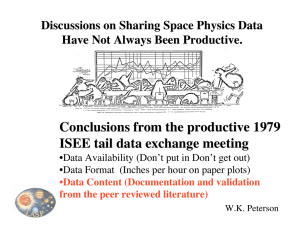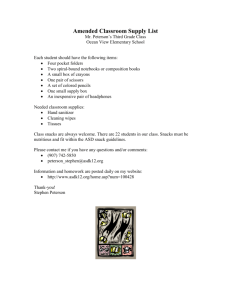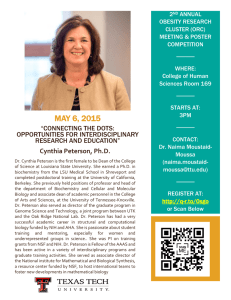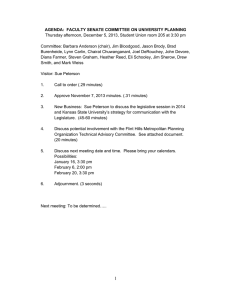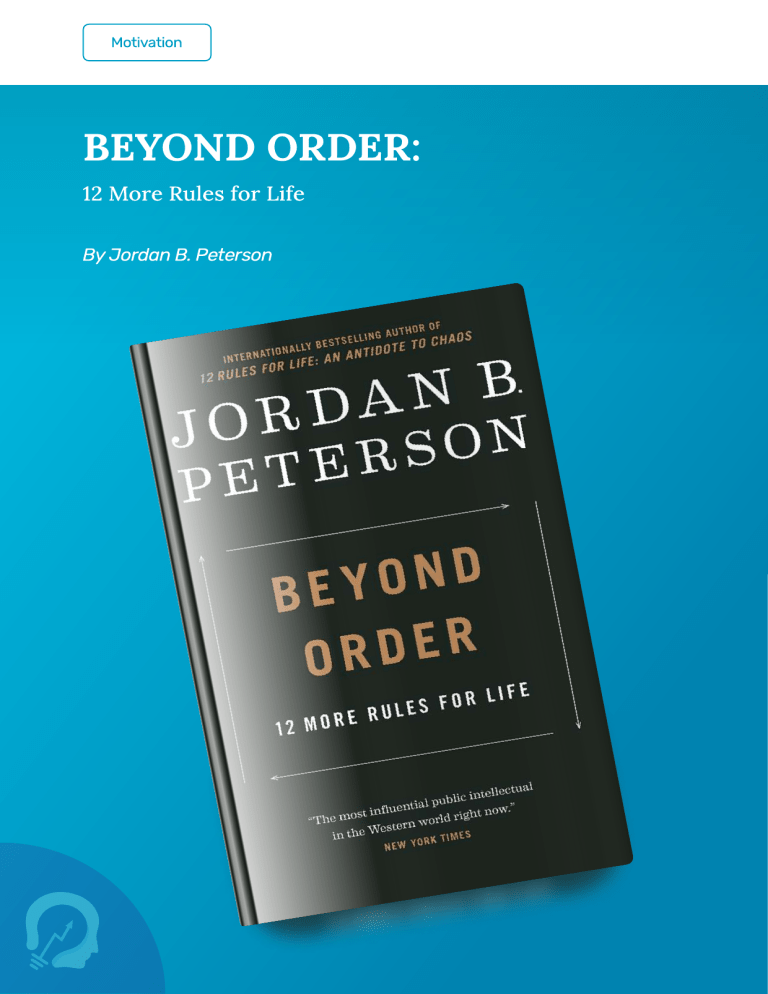
Motivation Beyond Order: 12 More Rules for Life By Jordan B. Peterson Foreword: Peterson's new book, Beyond Order, is a continuation of his previous book, 12 Rules for Life, presenting an additional 12 rules based on the same framework. However, it takes a different approach from the first book, which analyzed the effects of too much chaos and offered ways to manage them. Essentially, the two books serve as counterbalances to one another. "Pathologies of chaos" vs "pathologies of order" is how Peterson described his two books, wherein the first will appeal more to conservative types. In contrast, the second will appeal more to liberal types. "12 rules for life" started by explaining how too much chaos can lead to problems and how to solve them. On the other hand, Beyond Order emphasizes what is opposed to - too much Order: how to deal with it and who can help. Peterson describes the universe as "explored territory", where things that occur can, in many cases, be predicted. But, on the other hand, unpredictability, novelty, and disruption are the hallmarks of chaos. Therefore, when there is too much Order - for example, in totalitarianism - it is necessary to find renewal by moving beyond Order. Main points: 1. Rule 1: Don't denigrate social institutions or creative achievements carelessly. 2. Rule 2: Think about who you could be and then aim single-mindedly for that. 3. Rule 3: Keep unwanted things out of the fog. 4. Rule 4: Recognize that opportunity lurks where responsibility has been abdicated. 5. Rule 5: You should not do what you hate. 6. Rule 6: Abandon ideology. 7. Rule 7: You should do your best in at least one area and see what happens. 8. Rule 8: Make sure that at least one room in your home as beautiful as possible. 9. Rule 9: Whenever you feel upset by old memories, write them down carefully and completely. 10. Rule 10: Work hard to keep your relationship romantic. 11. Rule 11: Don't become resentful, deceitful, arrogant. 12. Rule 12: Be grateful despite your suffering relationships can make you happy. or 1. Rule 1: Don't denigrate social institutions or creative achievements carelessly Communicating with others is essential to maintaining an organized mind. The purpose of discussing the past is to clarify our stories and avoid stress over trivial issues. Defining our present and future (and why) helps us figure out where we are and where we're going. The process of talking through this all equals organizing, and others' judgments and reactions help with it. We outsource the problem of sanity. People remain mentally healthy not merely because of the integrity of their minds, but because they are constantly being reminded how to think, act, and speak by those around them. Peterson also begins his psychological assessment by examining a patient's "social worlds." Are they well educated? How do they spend their free time? What plans do they have? Is there a health issue or economic problem? How many family members and friends do they have? Does the relationship exist? Careers? The psychologist considers that the client is not adequately embedded in the world if too many of the questions are negative. A good solution to a problem involving suffering must be repeatable, without deterioration across repetitions – iterable, in a word – across people and across time. The condition of the world and the negative aspects of humanity left a Peterson's patient paralyzed for months. Yet, despite not being a productive member of society, she felt moral superiority. According to Peterson, a beginner should accept their place in the hierarchy and walk before running. Conservative and creative transformations both have their benefits and drawbacks. Different backgrounds, political opinions, and personality types complement and maintain balance (In particular, when the ratio is too skewed in one way). Stories provide us with a broad template. They outline a pattern specific enough to be of tremendous value, if we can imitate it, but general enough to apply even to new situations. In stories, we capture observations of the ideal personality. Even if you understand the rules and the necessity for social institutions and how they prevent chaos from taking over but believe that an exception is necessary (and think you can make a sound judgment about that), you serve the spirit of the law rather than the law itself. Morally, that's a good thing to do. However, if you disregard the value and necessity of rules (Order) and disregard them carelessly, you destroy tradition and stability, which will have consequences. 2. Rule 2: Think about who you could be and then aim single-mindedly for that What makes you think you are who you are? You are more complex than anything else in existence, more complicated than anyone else. You are which will have consequences. further confused by your ignorance and confusion over who you are and what you could be. A person is more than something they are. There is a limit to what you can understand about what you are becoming - and that limit also extends beyond your understanding. Every person has the sense that there is more to them than they have allowed themselves to see. Health problems, misfortunes, and the general tragedies and mishaps of life often obscure that potential. However, it is also possible to hide behind an unwillingness to make full use of the opportunities that life offers - which is facilitated by grievous errors of all types, including failures of discipline, faith, imagination, and commitment. How did you come to be here? Who would you be if everything is possible for you? How does Peterson answer the question of "who are you?"? There is a force within each of us that, when faced with the unknown, understands the nature of evil and turns chaos into Order (or reduces Order to chaos if the pendulum swings too far in that way). According to him, this is essential for human survival, but it isn't easy to comprehend. Through stories, we learn what we strive for - in terms of values and goals. Everyone needs to have a story to help them move from chaos to a framework that will help them structure their actions and perceptions. A better beginning and an even better ending are essential for every story. Peterson suggests that we get our stories straight - our past, present, and future. To reach our goals, we need a plan to take us from where we are to where we want to be. Chaos, uncertainty, and unpredictability will drown us if we don't act now. The path "constitutes the very border between order and chaos which, when traversed, restores the balance between the two." Would it make sense to change plans or paths? To ensure you aren't just giving up, try looking for challenges and difficulty on the new approach to make sure that's not what you are doing. It is safe to assume that you are not deluding yourself if you answered yes to the question. 3. Rule 3: Keep unwanted things out of the fog Life is what repeats, and it's worth getting what repeats right. Everyday events are essential, and any minor problem should be addressed as soon as possible. The majority of people avoid discussions or arguments over minor, trivial things. This, however, is unhealthy since they repeat again and again, and at some point, it won't just be a little problem anymore. Hiding your emotions and motivational states is a result of hiding your inattention to them, as well as the fact that you refuse to say anything about them, either to yourself or to anyone else. There is always an underlying problem behind every emotion or anxiety we experience. If you walk through the fog without seeing the possible dangers and obstacles (and opportunities too!), you will certainly fall into their snares. Furthermore, you won't have the energy to simultaneously handle all of these issues, as they will grow in the darkness until they overwhelm you. Therefore, it is much better to face things on time and resolve them. 4. Rule 4: Recognize that opportunity lurks where responsibility has been abdicated A person's most significant accomplishments and their most valued achievements typically include the things they struggled to achieve. where responsibility has been abdicated It appears that the meaning that most effectively sustains life is found in the adoption of responsibility. This means that to attain meaning, some difficulty is necessary. You must sacrifice something of your manifold potential in exchange for something real in life. Aim at something. Discipline yourself. Or suffer the consequences. And what is that consequence? All the suffering of life, with none of the meaning. Is there a better description of hell? Rather than just preparing for the present, people plan for the future. We treat those potential future states as if they were already real. Future events are likely to manifest in the here and now, which encourages us to take actions that would otherwise seem wasteful or unproductive. When we pursue worthwhile goals, we experience positive emotions. This implies something crucial: no happiness in the absence of responsibility. Meaning comes to you in direct proportion to the intensity of your commitment to responsibility. Your inactivity is because you do nothing to improve the situation. As a result, you minimize unnecessary suffering. Taking action and speaking up for those around you inspires others. As long as you control your own or another's malice, you are preventing it from spreading. Abdication of responsibility is often expressed in disenchantment and disappointment. However, whenever your annoyances, irritations, or frustrations are presented to you, you can change them and take responsibility for doing so. 5. Rule 5: You should not do what you hate A simple task that has no real purpose can destroy your motivation and demoralize you. What is the reason? Because we are motivated to do things because we feel they are important and valuable - and they are worth sacrificing for. We are harming ourselves when we have to do something stupid or pointless, contrary to this. People often act despite their conscience […], and hell tends to arrive step by step, one betrayal after another. […] If you do not object when the transgressions against your conscience are minor, why presume that you will not wilfully participate when the transgressions get truly out of hand? There is no doubt that the road to hell, personally and socially, is paved not so much with good intentions as with the adoption of attitudes and undertaking actions that inescapably disturb your conscience. 6. Rule 6: Abandon ideology Creating an ideology or an "ism" is a relatively straightforward process. For instance, the economy, the rich, or oppressors are all concepts that vastly simplify complex phenomena. The ideology starts by bringing together a 6. Rule 6: Abandon ideology few abstractions whose low-resolution representations hide a great deal of the world. Afterward, the pieces are referred to as problematic and villains are designated. After that, several causal powers are assigned that explain these problems, and a theory appears that describes real-life phenomena within the parameters set by this new school of thought. As a result, the propaganda phase begins: everyone who refuses to acknowledge and use this new system of thought is demonized and excluded. Beware of intellectuals who make a monotheism out of their theories of motivation. In more technical terms, Beware of blanket univariate (single variable) causes for diverse, complex problems. […] The attraction of doing so is, however, obvious: simplicity, ease, and the illusion of mastery […] and, let us not forget, the frequent discovery of a villain, or set of villains, upon which the hidden motivations for the ideology can be vented. Fighting patriarchy, reducing oppression, promoting equality, transforming capitalism, saving the environment, eliminating competitiveness, downsizing government, or running every organization like a business is impossible. A concept of such a low resolution is simply unacceptable. 7. Rule 7: You should do your best in at least one area and see what happens Aiming for something is a part of maturation and is necessary for growth and improvement. Unless you have a goal or direction, every little thing will bring you down, and you won't know where to turn or what to do. area and see what happens Through his clinical practice experience, Peterson claims that people committed to their work are more likely to succeed. Studying, working, having a relationship, etc., all require a commitment to some extent. Although not perfect, committing to some degree is better than not committing at all and making sacrifices. There are many things to which we could commit ourselves. Given the plethora of alternatives, it is possible to make a case for any given commitment's arbitrary and meaningless nature. It is not possible to make a similar case for commitment: The person who does not choose is lost. A person is better off becoming something than remaining nothing but becoming something. Although becoming something is accompanied by fundamental limitations and disappointments, we still do it. Cynics despair that there are bad decisions everywhere. Taking no action is the worst decision you can make. 8. Rule 8: Make sure that at least one room in your home as beautiful as possible Beautiful things are not easy to make, but Peterson argues that they are worth the effort. When you start with one beautiful thing in your life, you can expand it to other beautiful things, and that is the reconnection when you were a child, and you could see the true beauty and majesty of the Beings around you. It can be overwhelming to open ourselves up to the beauty in the world that we as adults have painted over with simplicity. In not doing so, however […] we lose track of the grandeur and the awe the untrammelled world is constantly capable of producing, and reduce our lives to bleak necessity. There are sayings in many cultures that warn against standing out. Creativity is a risky endeavor, and it is very likely to fail -- but it is essential for change and transformation. "We need the new, merely to maintain our position." It is beauty that leads you back to what you have lost. When you see beauty, you are reminded what will never be cynical. Beautiful things straighten your aim with their beckoning. The beauty of life reminds you that we all have worth, no matter how small. Life is filled with many things worth living: love, play, courage, gratitude, work, friendship, truth, grace, hope, virtue, and responsibility. However, beauty is one of the greatest. 9. Rule 9: Whenever you feel upset by old memories, write them down carefully and completely It's important to understand who we are and where we are going to have a sense of direction in the world. Additionally, knowing our past experiences is crucial - if you're unaware of your past, how can you understand where you are today? By the time we're done, we'll have created a map that will guide us around. We make the world what it is, from the many things we perceive it could be. Doing so is perhaps the primary fact of our Being, and perhaps of Being itself. We face many prospects […] and by choosing one pathway rather than another, we reduce that multitude to the singular actuality of reality. In doing so, we bring the world from becoming into Being. Our profession is cartography, making maps; our profession is geography, studying the land structure. In more specific and precise terms, we are charters of courses, sailors, and explorers. The stories we tell are born of places, of positions we occupied at the time they began. We must learn from the past's pitfalls to prevent the former and not repeat the latter. Clearly understanding where we are now, where we've come from, and what's next is essential. The causal analysis must be undertaken: we must know what happened, why it happened, and how it happened. When our past has not been adequately addressed, and there are still unresolved issues, it hurts the present. Whenever we refuse to acknowledge our mistakes, our surroundings expand into the unknown and become predatory. 10. Rule 10: Work hard to keep your relationship romantic It's essential to think about the whole relationship when maintaining romance. To realize this strategy, you will need to negotiate well, which means knowing what you want and discussing it. However, sharing your desires openly can be challenging, even if you know what you want since you are opening yourself up to failure or ridicule. So people sometimes keep their wishes quiet and vague. "There are three states of social being: tyranny (you follow my orders), slavery (I do what you want), or negotiation." Tyranny is evil for the slaves and bad for the tyrants (cynicism, cruelty, anger, etc.). Moreover, slavery is not good either, since a slave is miserable, resentful, and angry. Relationships can only be resolved through negotiation (a problematic undertaking). 11. Rule 11: Don't become resentful, deceitful, or arrogant Peterson describes the case of a patient whose family had spent their lives trying to protect him from everything harmful and evil. However, as a result, she was unprepared for the general harshness of life and could not cope. After exploring those things that she had been avoiding, she came to a solution that worked for her. What causes people to become resentful? "You are resentful because of the absolute unknown and its terrors, because nature conspires against you, because you are a victim of the tyrannical element of culture, and because of the malevolence of yourself and other individuals." A person's "fundamental instinct that guides them through life's difficulties" is corrupted and distorted by self-deception. When people are truthful, they can rely on their instincts and guide, but they cannot trust their judgment when they lie to themselves. The best attitude to the horror of existence is to believe that you, society, and the world are sufficient to justify life. The alternative to resentment, deceit, and arrogance is the assumption that we are interconnected and interdependent. Faith in yourself, in your fellow humans, and in the structure of existence itself entails the conviction that you possess the ability to overcome reality and to make your life the best that it can be. Having sufficient nobility, grandeur, and intrinsic meaning in your life may allow you to tolerate the harmful elements of existence without transforming everything around you into something resembling hell. 12. Rule 12: Be grateful despite your suffering allow you to tolerate the harmful elements of existence without transforming everything around you into something resembling hell. Even though I regard the inevitability of suffering and its exaggeration by malevolence as unshakable existential truths, I believe even more deeply that people can transcend their suffering, psychologically and practically, and to constrain their malevolence, as well as the evils that characterize the social and the natural worlds. As Peterson explains, some individuals face suffering courageously and make a difference amid that suffering. Therefore, he asserts that optimism is better than pessimism; he finds optimism more reliable. Of course, keeping a positive attitude in the face of darkness is not easy. Still, if someone looks at darkness and remains optimistic (instead of cynical), then that's something else entirely. It is also possible to be grateful in similar ways: even though life can be demanding and full of suffering, you have made a conscious effort to see the good in yourself and the world. Thus, gratitude is not about suffering but rather about being thankful for the opportunity and possibility that exist. Conclusion Peterson's first book, 12 Rules for Life and Beyond Order, act like Yin and Yang, respectively. In a chaotic world, the 12 Rules for Life emphasize the importance of Order. Beyond Order, on the other hand, argues that a bit of chaos is necessary for innovation and positive change. However, the Left must recognize that our social institutions are tried and tested. In contrast, the Right must accept that creative change and innovation are vital in an environment ripe with chaos.
